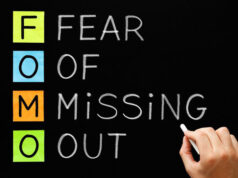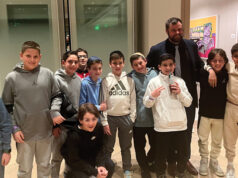 Said Mrs. Baila Rosenberg*, a 34-year-old mother of six from Williamsburg who had just donated her kidney to a needy recipient the day before, “It was a match made in heaven. And she told me, ‘I owe you so much! I owe you my life,’ but I said, ‘no, you don’t owe me anything. I gave up my kidney to Hashem, and He decided that you were the one to receive it.’”
Said Mrs. Baila Rosenberg*, a 34-year-old mother of six from Williamsburg who had just donated her kidney to a needy recipient the day before, “It was a match made in heaven. And she told me, ‘I owe you so much! I owe you my life,’ but I said, ‘no, you don’t owe me anything. I gave up my kidney to Hashem, and He decided that you were the one to receive it.’”
Thus Mrs. Rosenberg summed-up an entire episode that began with the mere consideration of an idea, and concluded with a life-saving kidney transplant for Mrs.  Mazal Harari*, a 46-year-old mother of three from Flatbush, recuperating just four doors down the hall of Montefiore Hospital at the time of my visit.
Mazal Harari*, a 46-year-old mother of three from Flatbush, recuperating just four doors down the hall of Montefiore Hospital at the time of my visit.
The Renewal organization, having facilitated the transplant, asked me to be m’vaker choleh (visit the sick) both donor and recipient after the surgery to attend to whatever they might need and to lend some cheer. I was able to provide some small comforts, but came away with much more than I gave—a newly-formed, illuminated definition of hakoras hatov (gratitude). Since the lesson was not read in a textbook, but given in  real 3-D life, it went straight into my heart where I hope it will stay forever.
real 3-D life, it went straight into my heart where I hope it will stay forever.
Back to my visit with the donor, Mrs. Rosenberg. Her words were brief: “It is a zechus (merit) to have been able to do this. I did it because I just had to find a way to say thank you to the Ribbono Shel Olam (Master of the world),” she explained, her face bursting with incredulity at the miracles done for her. “I was given so, so much—I had to try to  give something back!”
give something back!”
Oh my gosh, I thought, what happened to her? What did she go through? I shuddered and mentally ran down a list of possible horrors that she might have narrowly escaped.
Mrs. Rosenberg noted my curiosity: “You are wondering how I got to this point of donating a kidney?”
“Yes,” I confessed, riveted in anticipation of the vivid, extraordinary tale of danger and deliverance about to unfold.
“Well, one day, about a half year ago, I was having a repair done in my home. Suddenly, a chip of material went loose, hit my ear, and actually went in.”
Oh my, what am I going to hear? What danger, what disaster, G-d forbid—I could hear the sirens, even now. She was probably whisked into emergency surgery to remove the piece that perched itself perilously close to the eardrum—if they didn’t get it out within the first few minutes…
“So I went to the doctor, and he took it out.”
What? That’s it? “You mean he just took it out and that’s the great miracle?” I asked, perplexed.
“It was routine, thank G-d, not complicated. The main thing is that it brought me into the doctor’s office; that’s why I mentioned it. While I was there, one of the staff said, ‘Mrs. Rosenberg, you’ve never had a well-visit—let’s make an appointment for a general check-up with a blood work-up.’ And soon after that I went in for my appointment.”
Ok, I thought, now we’re getting to it. The results of the blood test were not straight-forward. The office called to say they had found something, G-d forbid, and she had to run back immediately. After the second appointment they still weren’t sure, so they checked her into the hospital for more testing and diagnosis. When the results were in she heard that… and it was only later when she found out it was all a mistake…
“A few days later, I received the results of my blood work-up.”
Here it comes. I gripped my seat.
“And can you believe it? Everything was fine! After nervously waiting those few days for the results, and then getting that unbelievable gutte besurah (good news) that I was in good health, I was beside myself with joy! I can’t even describe my gratitude and happiness. I didn’t know what to do with myself!”
“Oh, uh huh, I see.” So concluded her dramatic account of peril and salvation—‘just’ a report of good health. Relieved that she had averted danger, I was still confused. What was the miracle?
“What a great gift He gave me! How would I ever be able to say thank you?”
One minute, I thought. You’ll excuse me, but I think you just don’t get it. Being ecstatic is reserved for when you thought something could be terrible, and only later you find out it was really nothing, but this—getting a thumbs-up from a well-visit—I mean, it’s really great and everything, so stop and send up a quick ‘thanks’ to Hashem—but then get back to your day.
“I was bursting! Can you imagine? Nothing wrong—just healthy! I was dancing around my apartment for days. I couldn’t stop saying ‘thank you’ to Hashem for what He gave me. How will I, such a small being, ever be able to express my hakoras hatov (gratitude) to Him for this?”
Squirming in my chair, I began to get the picture, and it wasn’t comfortable.
“I felt like a little child who was given a humongous, round red lolly, that covered his whole face and took days to eat. Who gave it to me, he wondered? Oh, my father. So he went looking for his father to give him a lick of the lolly. And his father thought, wow, my child thought of me, he sees it came from me, he loves me. The father is so excited to hear from him.
“That’s how I felt. Here I am—healthy! I can breathe. Father, You gave me my breath. I want You to know how excited I am, but I’m just little—what can I give You? I’ll live as a Jew; I’ll breathe for You.”
At this point my eyes filled up with tears of shame. Do I ever even notice what I am given every single moment?
Rabbi Avigdor Miller, of blessed memory, said that a person has to appreciate and daven (pray) for his health while he has it; because afterward, G-d forbid, it takes special merit to get it back. He used the comparison of someone walking down the street who sees he is about to get a parking ticket. If he gets there quickly enough to greet the policeman beforehand, he might get off the hook; but if the ticket was already written, a lot of effort is needed to get out of it. Ask Hashem to help you when you’re well and it will come more easily; once sick, Heaven forbid, it requires more hishtadlus (effort) to get out of it. Rav Miller’s lesson was embodied and alive, right before my eyes.
“It was around that time,” continued Mrs. Rosenberg, that I read an article about how a woman had donated a kidney to someone through the Renewal organization. They help donors and recipients through all the processes of transplantation—and I thought, maybe that’s how I can finally say thank you to Hashem for His great gift.
She continued, “someone in my community needed a kidney, so Renewal began to test potential donors; I decided to have myself tested. I’m not used to hospitals and didn’t want to go alone for the two half-days of testing, so Renewal set me up with people who already knew the ropes, and I felt much more comfortable. They also sent me their Guide for Kidney Donors, an impressive booklet that describes everything involved in kidney donation step-by-step.
“In the end, I wasn’t a match for that person, but Rabbi Friedman, the program director, asked if I would be willing to test for someone else on their waiting list, and I said yes.
“A short while later, Rabbi Friedman called to say that I matched someone—I was so excited! I told Renewal I’d like to move to the next step. Rabbi Friedman suggested that I first talk it over with my husband, family, and our rabbi for their guidance and advice, as to whether I should do it, and if yes, whether it was the right time for it. My husband was very supportive; he gets a lot of the credit—you can’t do something like this without support. He even said h
e might want to do it himself one day. And then we went to our rabbi who gave us his blessing.
“A lot of questions came to mind, so I called Renewal along the way. Rabbi Friedman answered all of my questions patiently, and was always available. I felt very supported, yet never felt pressured during the process. In fact, I was told on more than one occasion to take my time and make sure that it was the right thing for me.
“As it became more and more of a possibility, I have to admit that I hesitated for another reason—financial. Even though the surgery itself would be covered by the recipient’s insurance, there were a lot of other expenses. It would be two weeks off work without salary, transportation to and from the hospital for me and for my husband’s visits, babysitting, meals, housekeeping—I didn’t think I’d be able to afford it.
“Renewal had already reimbursed my traveling expenses for the two half-days of testing. Now they offered to pay for all those other expenses, including my salary for two weeks! I had wanted to give my kidney, and now a huge obstacle was lifted away. It started to look like it really might happen.”
While Mrs. Rosenberg paused to take a bite to eat, her first food since the surgery, she recalled, “During the week before the surgery, I could hardly eat anything.” Pre-surgery jitters, I figured—perfectly natural.
“Everyone’s nervous before surgery, aren’t they?” I asked.
“No, I wasn’t scared medically,” she said.
Somehow I wasn’t surprised.
“I was just so excited about what was coming up—only a few months had passed since this was just a thought, and now it was really happening! When you’re about to do something so big, so special (she closed her eyes; her face was that of someone about to marry off her first child)—you just can’t eat.”
Mrs. Rosenberg’s affinity with her recipient was great. Upon seeing Mrs. Harari for the first time after the surgery, Mrs. Rosenberg told her, “I feel that our neshamos (souls) must be so connected, that you were the one to get a part of my body.”
The Hararis’ gratitude filled every corner of the room. Mrs. Harari described feeling like a new person, having just spent eight months undergoing grueling dialysis treatments. “Those eight months were the worst of my life. My children couldn’t take how tired I was all the time. Who knew that this unbelievable person would suddenly come out of nowhere—drop down from Heaven—and I would have a refuah (healing)?”
Her husband could not speak without tears, his arm continually pointing upward, astounded at the yeshua (help) that Hashem had arranged for his wife, himself and their family. “It is unbelievable. It is a miracle,” he kept saying. “She’s an angel—she didn’t even know my wife. When I think of it, I get the shivers.” Mr. Harari then went on to describe the morning when the two women met for the first time, right before surgery. “What can I tell you; they were just crying and hugging, hugging and crying. It was an indescribable scene. The whole room was quiet, except for the crying. Everyone was looking at them, wondering what was going on.”
One of the simchos (happy events) of a donor is the first use of their own kidney following the surgery. I was privileged that it happened within the two hour period of my visit; I yearned to hear that first asher yatzer (referring to the blessing recited after use of the bathroom) following such a unique surgery, and from such a person. Needless to say, I was not disappointed. Each word’s meaning was conveyed as it was spoken out with slow, clear articulation, its significance not lost on any of us (even the Chinese nurse on duty seemed to appreciate this special moment) and the resounding “Amen” by the group surrounding her—including the Harari’s—was rejuvenating.
We walked down the corridor with the help of Pat McDonough, Montefiore’s transplant coordinator, who gave Mrs. Rosenberg some helpful post-surgical hints. Mrs. Rosenberg was very grateful to Pat for all the care and attention she received from her during the entire process.
Back in her room, we were greeted by Mrs. Harari’s sister who came loaded with fancy pastries, ice cream, juices and dips for Mrs. Rosenberg. “We took care of my sister already. Now I’m here for Mrs. Rosenberg, who…” She didn’t continue, as her eyes filled up with tears.
After helping to settle all the goodies into place, I reluctantly prepared to leave. “Everyone has a cheilek E-loka mi’mal (a portion, so to speak, of the One Above),” Mrs. Rosenberg told me. “It’s a matter of how much we connect to it in ourselves that lets us go further and do more. May you always be zoche (privileged) to be an utterly, complete eved (servant of) Hashem,” she bentched (blessed) me as I left; halevei (hopefully) it should come to be.
Back at home, a couple of days later, Mrs. Rosenberg reveled in just sitting and resting with her heating pad. “Since I’m a choleh (unwell person), I know that the Shechina (Divine presence) is by my head. At the hospital, there were so many people, it was more like a show. I love being with the quiet, just sitting here with the Shechina.”
I told Mrs. Rosenberg that I had expected a dramatic story to explain her fervent wish to give back. But Mrs. Rosenberg doesn’t need theatrics to be elated.
“Life is dramatic. Everything He gives us; everything He does for us—it’s… dramatic!”
May we all realize the gifts bestowed upon us endlessly, appreciate them deeply, and use them to thank and connect to Hashem. And may our doing so be a zechus for Mrs. Rosenberg, Mrs. Harari, and all of Klal Yisroel.
__________________
*Names and identifying information have been changed.



